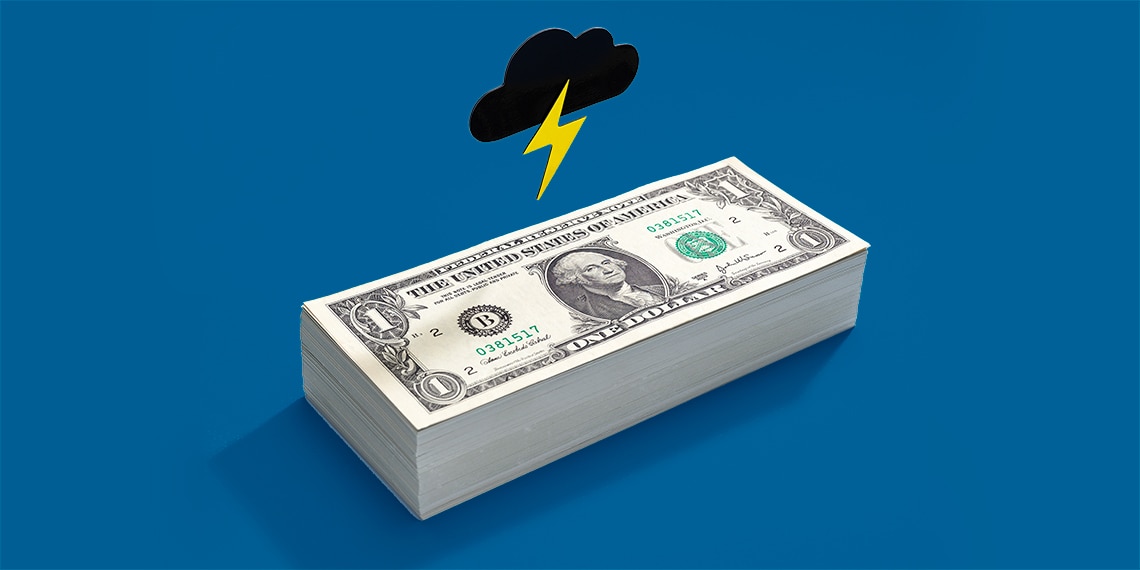
In a tough economy, it’s easy to let fear or anxiety dominate how you handle your money. Instead, let these circumstances give you a reason to change how you manage your finances. “Whenever something like this happens, it’s a time to reevaluate your relationship with money and the value you put behind it,” says Liz Frazier, a New York-based financial planner, speaker and author of Beyond Piggy Banks and Lemonade Stands: How to Kids Young Kids About Finance.That means it’s time to look at how you handle the cash you have, so you can ensure that you can pay all of your bills and maintain your savings. “Clearly, there are those people who’ve lost jobs and are in survival mode,” says Frazier. Even if that’s not you, “none of us are going to be untouched by this; there will be a ripple effect for years to come. This is a wake-up call for all of us to reevaluate our spending and budgeting.”
Here are six smart moves to make with your cash (and mistakes to avoid) in times of economic uncertainty.
1
Reevaluate All Spending
Take a look at your monthly budget. If you don’t have a budget, make one. Include all categories of spending—every loan statement, every bill, all your cash expenditures—in the last two or three months, Frazier advises. “Start cutting out things that aren’t essential,” Frazier says. “You’ll be surprised—that magazine you forget that you get, that digital subscription … this is the time to take a hard look and go back to needs versus wants.”
One easy cut? Panic shopping’s ugly twin: boredom shopping. “Maybe you use online shopping to cheer you up or reward yourself,” says Frazier, “but that’s unnecessary shopping to fill an emotional need.”
And yes, paring down your spending is a smart move for nearly everyone, she says, even if you’re financially secure at the moment. After all, these uncertain times may continue. “This will affect everyone in one way or another,” she adds.
2
Manage Your Debt Wisely
Right now, having cash is more important than aggressively paying down debt, Frazier says. “Aggressively paying down debt is for when you’re in a good financial position,” she points out. Bolstering savings takes precedence if you’re not. To start, aim to have at least three to six months of cash in your emergency fund.
But that doesn’t mean you should neglect your debts or bills. If you’re having trouble paying bills, call your student loan provider or mortgage company, for example. If you’ve lost income due to a job loss, furlough or pay cuts due to the pandemic, they may be able to work with you on a payment plan.
3
Use Your Emergency Fund Cautiously
“You don’t use your emergency fund for takeout, for new clothing or for subscriptions,” Frazier says. “Before you touch your emergency fund, you’ve gone through your budget and gotten rid of everything that is not essential. Take the mindset that this is the last resort.”
That means finding ways to reduce seemingly fixed expenses, too. Try comparison shopping for lower rates, then calling your cell phone or internet providers to see if they can offer a competitive price. If you are receiving unemployment payments, it’s ideal if you can trim your budget to the point where you can live off unemployment before touching your emergency fund.
4
Stop Panic Shopping
Financial decisions made while in panic mode are likely to be emotional, rather than rational and based on a plan. So take a deep breath and consider, when you can, using the 24-hour rule: If you want something, try to wait 24 hours before purchasing. If after that waiting period, you still want it and can afford it, proceed.
You should also look at what you’re calling a necessity. “Studies show that right now we’re spending more on food and supplies than we normally do, and there’s no real reason for it,” Frazier points out. Follow the government guidelines—for example, having two weeks of food and 90 days’ worth of prescriptions on hand—and then don’t sink any more capital into those items. “It doesn’t help,” says Frazier. “You’re spending all this money and [the supplies are] just sitting there.”
5
Prioritize Savings
Your top savings priority will depend on your life stage. If you’re younger and you don’t have an emergency fund, Frazier recommends building that up first, at least for the short term. Having a financial cushion in this environment is critical. If you’re older, keep focusing on retirement and pare down your budget as much as needed to help you with that priority.
Regardless of your age or amount of savings, don’t undo years of hard work and risk your future by raiding your retirement or college savings accounts—and paying the accompanying fees and penalties—except as an absolute last resort.
6
Consider Side Hustles Carefully
If the side hustle is a choice, not a necessity, carefully consider how much capital you put into it. It’s not the time to take a big financial risk, Frazier says. Likewise, if you’re not considering extra work out of simple need, you might want to consider the emotional, physical and mental cost of trying to juggle one more responsibility right now. “Take a look at your budget, do the debt management—do those things first to see if you can get to a comfortable place from there,” she says. “We really have to think about our emotional health right now, too.”
Julie Anne Russell is a Brooklyn-based freelance journalist. She writes on personal finance, small business, travel and more.
READ MORE: 8 Ways to Recession-Proof Your Money and Continue Saving

